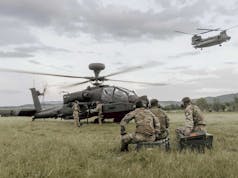The number of British Army personnel discharged due to depression has tripled in the past 6 years, figures show.
The figures published earlier this year show 104 personnel were discharged due to depression in 2017/18, up from 32 in 2012/13.
“You’re not depressed, I’ve seen you laughing and joking in the mess”
Unnamed British Army medical officer
There has also been a rise in discharges related to more general mental health issues: 428 in 2017/18, compared to 188 in 2012/13. These include PTSD, adjustment disorders, and stress.
The figures in the Royal Air Force and Royal Navy have remained low and virtually static over the same period.
Whilst the figures are shocking, the explanation may be a positive one. Neil Hallsworth, ex-Royal Army Medical Corps (RAMC), told me that ‘mental health and well-being is now a management issue and is routinely discussed in Command’. He suggested that better training and awareness likely explains the rise.
In contrast, prominent former army officer Colonel Richard Kemp told me that increased awareness may ‘have led more soldiers to falsely claim to have problems as a means of gaining discharge’. He believes that instead may in part explain the increase.
A MoD spokesperson said: “We take the mental health of our service personnel extremely seriously, and we encourage anyone in need to take advantage of the wide range of specialist support available.
“Former service personnel who have suffered from mental health issues can continue to access MOD services for up to six months after discharge, to help them during the transition period”.
The figures come amid widespread concern surrounding mental health in the Armed Forces, and in particular veteran suicide. It was revealed earlier this year that the Ministry of Defence (MoD) does not keep a record of the number of ex-servicemen and women taking their lives.
Nonetheless, social media provides a valuable insight into the number. 29-year-old Kevin Williams, who was the youngest British soldier to serve in Iraq when he was deployed on his 18th birthday, is just one of many who committed suicide this year.
The Defence Select Committee is currently conducting an inquiry into ‘Mental Health and the Armed Forces’. Journalist and author Matthew Green told the committee last month of a soldier who was on a 5-month waiting list for PTSD treatment. He killed himself because he “just could not hang on any longer”, having served for 18 years. His 11-year-old son is now suicidal and self-harming. He “wants to die and be with Daddy”.












No one prepared to comment on this? Well here is my thoughts on this issue.
I think that’s a rather sad reflection on the community that posts on here. Happy to talk about buying this that the other, but when it comes to people who have to do or done the actual fighting rather less so.
The lack of care for serving and exmilitary personnel is appalling, this has been the case for many many years.
The sad fact is more people who served in the Falklands have committed suicide after the war than were actually killed during that war.
Our service and ex-service personnel deserve much better than the current regime.
Totally agree with you Mike.
I had been hoping that all the great work by the Royals to highlight the need had done some good. Clearly the penny pinchers at the MoD think otherwise.
It is a national disgrace lots of Governments past and present have not given a hoot for veterans let alone those serving.
Something we could all do to help is pester our MPs or at least donate to the charities that are trying to do something.
The brain is like any other muscle it can be trained. Being the heroes that they all are quite frankly they and their families deserve all the help that can be given, every last one of them!
Mike wrote:
“The sad fact is more people who served in the Falklands have committed suicide after the war than were actually killed during that war.”
Mike ,
I’ve met the cast, got the T-Shirt, and thankfully am still sound of mind. (But I’m sure the trouble and strife might state otherwise). I undertook my EFP2 and for our project we decided on PTSD and it was something of an eye opener for us. As a whole we found the military wasn’t that understanding regards stress suffered on the job. The only people we found who had recourse to counselling (Army) were Bomb disposal , RMP, and Int and squint. The Navy did better and the RAF even more. We then went out and interviewed, The Police, Fire Service and NHS. Out of those 3 we found the police the worse, the fire service not much better and the NHS the best.
To its credit the Army has got a lot better, yes it could do more, but it is moving in the right direction . Personally I feel that a lot of this has to do how UK based units (vast majority now) Have civy doctors (As opposed to the old military doctors who really were a law amongst themselves) and are more prepared to listen to the person in front of them and afford them the best medical care. (For example I run a lot and have done for years, In Germany, I twisted my ankle badly a number of times. I was sent home with an elastic bandage and a chit excusing me from PT for a week) In Cyprus, I was referred by the RAF doctor to a bout of physio and a total ban on X-country. In the UK, i was referred to a civy Physiotherapist who concerned about how many soldiers from the camp were coming her way, actually reported the camp for abuse. (The fact i was a WO2 at the time was totally lost on her)
Then we had Afghanistan and Iraq and due to the public outcry regards the welfare of our soldiers the MOD had to seen doing something. To that end we received briefings before and after our tours . Certainly for the last few years of operations, troops were dumped in Cyprus, were they were allowed to de stress. Ok not for long, but again it was a move in the right direction. The army today is not the army of 10 years ago and certainly not the army of 36 years ago. Ironically this move in the direction of better welfare, is most derided by the older generation, which is funny as I can remember the previous generation having a laugh about how low the army has fallen when I joined up. Finally regards the Falklands suicide rate. That claim may not be factual, The BBC reported on it in 2013 and here is what they found:
Fewer Falklands War suicides than feared, study suggests
The claim that more Falklands veterans have killed themselves since the war ended than died in action is not borne out by statistics, a study says. Some 255 UK personnel died in action, but a veterans group has said the suicide toll since 1982 exceeds that. However, the Ministry of Defence has found 95 deaths were recorded as suicides or open verdicts.But the MoD has now investigated the circumstances of 21,432 Falklands veterans three decades after the end of the conflict, and found that as of 31 December 2012, some 1,335 had died.
That compares with an estimated 2,079 deaths that would have been expected among men of a similar age and background who did not serve in the forces, according to the MoD. Of those Falklands veterans, 7% of deaths – or 95 individuals – were due to “intentional self-harm and events of undetermined intent (suicides and open verdict deaths)”.That finding means that on average across the whole 30-year period, veterans were actually 35% less likely to kill themselves than the equivalent group of British men with no military background.
https://www.bbc.co.uk/news/uk-22523317
I can’t speak with any military experience of mental health issues, but my eldest daughter suffers from various conditions. I now live in the US and mental health awareness, treatment and accessibility is streets ahead of the UK, though I can see that the UK has now had its wake up call. Mental health services in general need to be available, accessible and with no stigma attached and of course military personnel by virtue of what they do need to be at the forefront of that. Perhaps with adequate treatment and services it won’t be necessary to discharge people thereby allowing them to continue their careers and saving in training costs? UK military leads the field in so many types of combat/trauma medicine, why can’t we add mental health to the list?
Best wishes to all who have or are suffering due to their service for this country. Come on MOD, let’s get the support for them sorted.
Having never experienced combat I cannot imagine what it is like to be in the thick of it, but it is obvious people are going to suffer serious mental problems as a result.
There will be those who may say that people knew what they were getting themselves into when they joined up, but I doubt many realise the reality of war. This especially goes for those on the ground and on the frontline.
The least we can do is provide for them in their time of need.
I would like to echo your comments here.
I’d also point out that I’m not very happy that support is only provided for up to 6 months after discharge.
Those who serve, form close relationships with their unit. To cast them out into the care of the NHS after 6 months when they are at their lowest, seems callous.
I dare say that proper support would at this time break the MOD budget.
I personnally feel we have a responsibility as a nation to the servicemen, who knowingly or not, risk everything for us, for so little. That responsibility ends when when the servicemans need ends, even if it is in 60 years time.
Mike Saul, discussion of mental health must be a difficult thing for those who have actively served. For those of us who haven’t, the fear of making assumptions and inadvertently causing insult makes commenting difficult.
When the forces scaled back we should have kept at least one of the service hospitals open. (Haslar probably the best option.) Service personnel would have been amongst their own during their treatment. And we would have had space to keep mental health patients in a nice safe place to aid their recovery for a long time.
And perhaps instead of selling off defence real estate (I thinking of the RAF stations mostly) we could find to build veterans’ villages for those unfortunately will never recover and will always need help? Sustainable, characterful houses/
We find money to house and cloth East Europeans who come here for benefits.
Mike it’s probably because most posters have no first hand knowledge of this topic and didn’t want to make assumptions and speak out of turn. My dad was most certainly affected by his experiences in Aden during the 60s, saw several of his colleagues killed in front of him and believes he killed at least one in defending his unit. That is my only experience of this and must say that all of our men and women in the forces deserve our respect and gratitude, and above all our full support both when in service and back in civvy street.
Yeah, agree Ron. One other factor is that mental health is a bit of a catch all, as opposed to combat related PTSD. With roughly 1 in 4 people experiencing poor MH in their life. So many will enter, serve and discharge with a mental health issue anyway. Some may have positive impact from higher self esteem and belonging, others may have negative impact from trauma/loss. It may be that military service attracts a higher proportion of people looking to fill a psychological hole, people are known to be attracted by status and belonging. However, none of this means people shouldn’t be well supported by their employer and the NHS.
I think it’s got to be positive news, both in terms of recognition and in making it easy to be discharged. Basically of people don’t want to stay, they should be free to go. Agree of course with the aftercare issue, sadly neglected for a long long time. And yet knowledge of available help and care would be an incentive to join up in the first place. Cheap shoddy thinking in the past, let’s hope it gets better, and from a harsh economic point of view, may well pay for itself.
Incidentally, this sort of thing plus security of tenure was in the ScotGov iScotland defence plans, how much is hot air and how much genuine determination would remain to be seen.
That is because the high command and politicians do not give a flying f@#k about servicemen and women. Away you go, hand in your ID card on the way out and here is your certificate of service. Toodle pip.
This is one issue where I have no interest in seeing specialist improved care for former service personnel. It misses the wider point that NHS mental health services are in a very poor state at the moment. Once discharged, ex forces people become the responsibility of the NHS. What they then experience is the same standard of care as any other member of the public – often absent or poor.
There are NHS workers trying their best but the system needs reform all the way through. Former service personnel can and should speak out about their experiences of care from the NHS. But they should do so to highlight the shortcomings that effect every person accessing those services, not just themselves.
This is a subject that I have plenty of experience with and I agree with everything said above. The Navy are way better at this then the Army, I spent a while with some Navy chaps at Collingwood and was surprised how much thought goes into looking after their people especially Marines returning to a ship after an op.
All services have come on a long way, it has now become the norm to talk about mental health and there is much more support out there.
BV
Nobody forced ppl to join the Armed forces !!!! It’s the claim culture gone mad . The claim culture is a serious threat to our Armed forces long term any future left wing government would try to destroy the the Armed forces with the claim culture spinning out of control . Blame and claim its a disgrace
It’s not about claims, it’s about support.
A useful link which may be of help?
NHS mental health services for veterans.
https://www.nhs.uk/using-the-nhs/military-healthcare/nhs-mental-health-services-for-veterans/
Oh give up the pifflle you throbber, you haven’t served, your most likely a troll therefore your opinion is not really qualified and your posts are just drivel most of us laugh at.
It’s a combination of all of the above. Yes there are a few lads who see an option of a few quid thrown there way, a few lads who see it as a way out and a few who want to get back at the organisation who gave them a job and who they feel have wronged them. But mostly it’s a reflection of society, of how we are more aware, and self-aware of mental health, of severe stress and PTSD which can become apparent form any job and any walk of life. The lads after WW1, WW2 probably suffered worse, but society deemed it be bad form to have any mental health issues, and people just cracked on, but to the detriment to themselves and most likely their family. Mental health is relevant and the Army has got a little better. But with the lack of operations and current “combat” you may find the military and the Army especially, take a step back and we lose the few gains we have managed to go forward with.
We have had 2 or 3 back to back morally gray wars, where it’s not too clear who are the bad and good guys and where the objectives of the wars was not clear. It’s not surprising that mental health problems have increased.
There needs to be a cultural change in the armed forces and encouraging people to not hide problems. Combine that with free confidential counselling services, where to outcome is not shared with the armed forces to avoid people being scared of using it. Yes it will have a small risk of people that shouldn’t be on active service remaining but that should be easily balanced out by the benefits.
After care needs to be drastically stepped-up as it doesn’t reflect the sometimes lifelong effects of battle traumor.